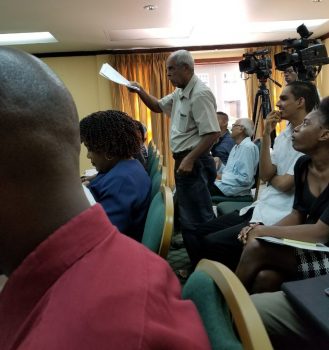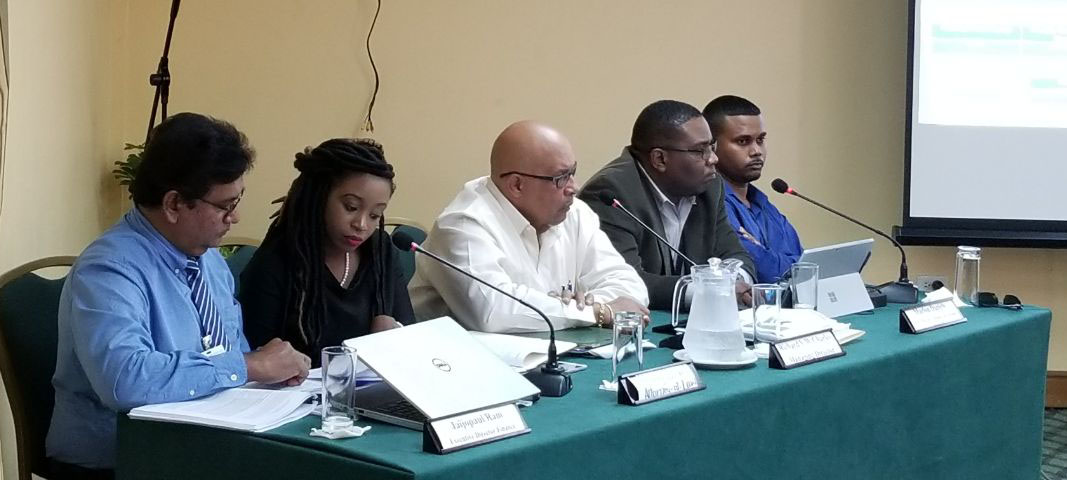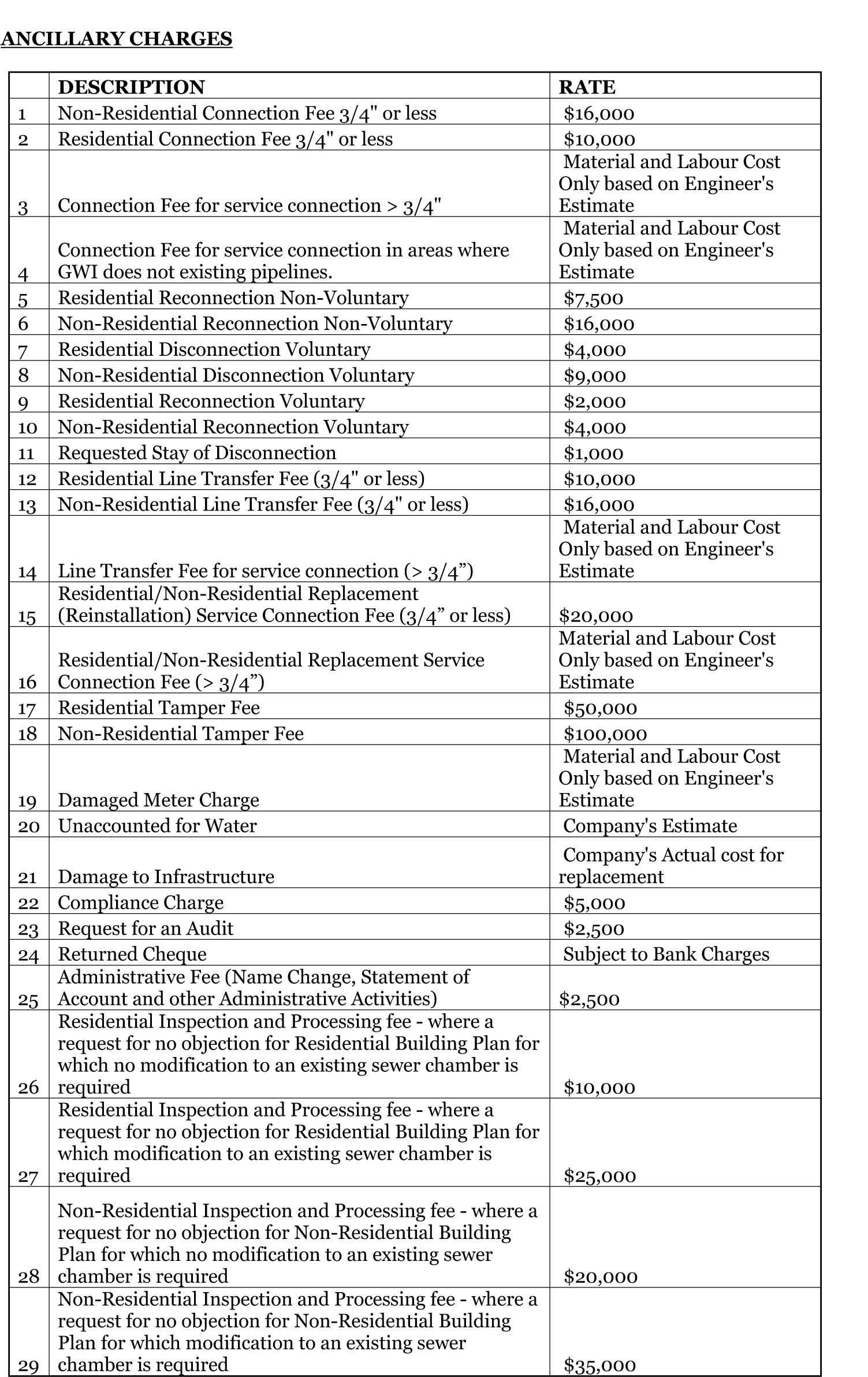The first public hearing to discuss the proposed rate changes by Guyana Water Incorporated (GWI) saw fierce opposition yesterday from the citizenry, who called for the utility company to produce a record of its accounts before proceeding any further.
GWI’s Managing Director Dr Richard Van West-Charles has undertaken to engage the entity’s board on the possibility of accessing the documents ahead of the next hearing before the Public Utilities Commission (PUC), which is scheduled for February 21st.
“…We don’t have financial statements here at all to deal with rates… when are we going to get down to the business we’re here about today? This cannot be allowed to continue hours and hours. This is ridiculous! It’s entirely ridiculous. We need to have the financial statements here…,” accountant and attorney Ramon Gaskin said as he pointed out that the presentations had gone on nearly 50 minutes and the meat of the matter had not been addressed.

Gaskin stood up just as Executive Director of Finance Jaijopaul Ram was about to make his presentation on Finance Revenue Collection and Customer Service, and so was asked by PUC Chairwoman, Della Britton, to allow the presentation to continue as they were now approaching that aspect of the hearing.
“… [Where] is the audited financial statements of the GWI so that we can inspect them and study them carefully? We need to have that…I need to know when we can get access to that…,” Gaskin pressed again, later on.
Van West-Charles related that external audits are currently being done on GWI’s 2016 accounts, and should be completed by the end of March. He offered instead the unaudited accounts for that year in order to have questions posed by the audience answered by next week.
In turn, Gaskin said that he is also willing to take a look at the unaudited 2017 management accounts, but Britton interjected to say that the commission does not share unaudited account information and, therefore, such information can only be provided with GWI’s permission.
“There’s a good reason for that but since they’re coming for more money, we should waive that rule,” Gaskin stated.
Britton said the rule could not be waived but GWI could provide consent. Van West-Charles then suggested that he approach the Board to get the members’ take on the matter.
‘Equity’
When GWI submitted an application to PUC last month for variations to its tariffs, it was stated in the application that the adjustments are needed not only to bring in sufficient revenue to meet the company’s total operating costs, but also to level the playing field in terms of the application of rates to the consumer.
In his presentation before the PUC, Van West-Charles related that the intention ultimately is to create a payment structure that brings equity across the regions.
“…For us to bring it home to you, [equity] is someone in Georgetown having a small home and their rate is $112 per m3 and someone on the East Coast at Le Ressouvenir, etc, in their larger homes, or up the Coast, would be paying a rate of $68 per m3. So the cost, in essence, for the treatment of the water, the inputs [are] the same… and therefore, we have to address this issue of the inequity and try to ensure that we have the resources available to ensure that treatment is available across the country,” he explained.
Ram had also related that the company is unable to recover all its operating costs from the current tariffs, those costs including those racked up from the Guyana Power and Light Inc. (GPL), which he said amounts to about $3 billion.
Van West-Charles’ presentation revealed that because of unreliable power supply from GPL, GWI has had to purchase 38 generators, at an average cost of $7 million per generator, and install current balancers to regularise voltage. The latter reportedly costs approximately $4 million per unit.
“Damaged motors resulting from poor power supply in 2017 was valued in excess of $28 million and motors with eight years of operating life usually expires within three years,” the presentation read.
He noted that where there is no supply of energy, water cannot be distributed. On this point, consumer rights advocate Pat Dyal suggested that GWI supply documentation of its losses which occur by theft and in transmission costs.
Van West-Charles had also related that another constraint to water supply is the age of the water distribution network. It was reported that 65% of the pipe network in Georgetown is over 40 years old, and so an upgrade is needed.
“…The real inequity is not with the 68 and the 112. The inequity is those who pay 68 and 112 and those who pay zero—that’s the inequity. The real zero people who don’t pay at all…that is the real inequity—those who are not metered and those who waste water all the time at the car wash and all, that’s where the real inequity is. We need to know that,” Gaskin put to the CEO.
“…these applications for rates does not tell me what are the existing rates and what is the new rates they’re seeking to get approved. Certain calculated percentages increase in changes—we need to know that. What is the present rate and what they’re looking for? We need to know that, absolutely,” Gaskin stated.
“…I stand with Mr Gaskin in connection with the accounts… people are paying. They would like to know what they are paying for, how they are paying, why they are paying, and the uses of paying. You just can’t come and bombard the public utilities for increases when consumers are not satisfied with the treatment they are getting,” George Seales, who identified himself as a consumer advocate, said.
Britton directed that GWI provide a comparison of the existing and proposed charges, particularly the proposed ancillary charges, as well as present the effects the new charges would have on the company. She also directed that they address the issues raised by the attendees of yesterday’s forum before the hearing next week, and provide the relevant documentation.
$50,000 tamper fee
When Britton enquired yesterday about changes to the Ancillary Fees, as she noted that some of the figures in the document presented to the Commission on February 6th differed from what was being relayed yesterday, Van West-Charles related that only the tamper fee had been changed.
He explained that this had been necessary because the tiered fees proposed before were illegal.
In the application posted online last month, there were residential tamper fees designated for the first, second, and third offence, and thereafter, a fee for more than three offences. The same applied for non-residential tamper fees.
The new fees are $50,000 for the residential tamper fee and $100,000 for the non-residential tamper fee.
In addition to that highlighted by Van West-Charles, there were other changes observed in the proposed fees, from the initial application, first presented in January.
There now exists a residential/ non-residential replacement (reinstallation) service connection fee, which is proposed at $20,000 for a connection 3/4” in length or less. If the connection exceeds this length, costs will be calculated based on materials and labour.
The fee for residential and non-residential connections now read $10,000 and $16,000, respectively (the original application showed $16,000 and $10,000, respectively).
While the original application put the rate for a returned cheque at $1,500, the new application states that it is “subject to bank charges”. It was explained that whatever charges the bank would incur to GWI would be payable by the customer.
Administrative fees of $2,500 are also proposed for services such as name changes, retrieving statements of accounts and other administrative activities.







